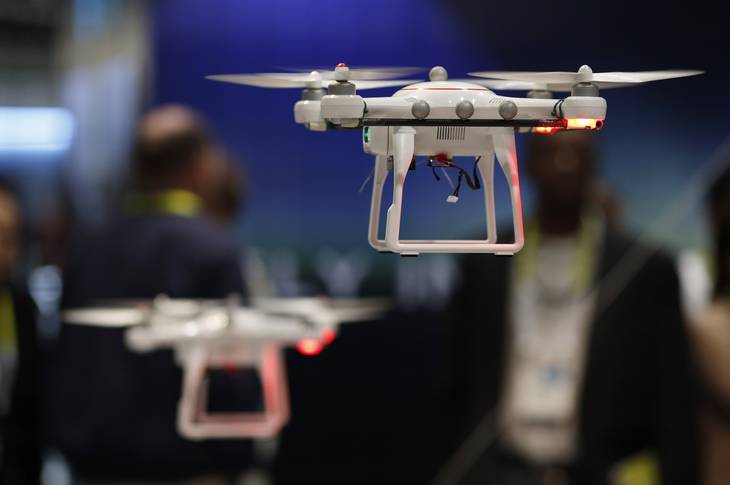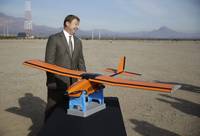In a small garage in downtown Las Vegas, two entrepreneurs from a tiny Canadian startup are working on what some believe will be the next major industry in Nevada: drones.
The startup, Fluttrbox, run by Aristo Mohit-Coker and Nadia Shiwdin, wants to connect two of the disparate communities that are converging to grow the sector: large institutional clients who need the detailed data drones can collect and hobbyist drone operators who can collect it.
Drones, once regarded as only military weapons or hobbyists’ toys, appear poised to become mainstream in the United States and already have become big business in Nevada. Steve Hill, executive director the Governor’s Office of Economic Development, has estimated Nevada’s drone industry could have an economic impact of up to $8 billion annually.
Nevada drone timeline
■ 1990s: Air Force starts piloting Predator military drones from Indian Springs Air Force Base
■ 2004: Desert Research Institute starts using drones to collect data for scientific experiments
■ 2007: Battlespace Flight Services opens
■ 2011: Drone America opens
■ 2013: FAA selects Nevada as one of six national drone test sites
■ 2014: Nevada Institute for Autonomous Systems established; UNR and UNLV start offering minor programs about drones; Nevada gets more drone companies, including Skyworks Aerial Systems, Ashima Devices, Flirtey and ArrowData
■ 2015: Nevada legislators introduce two drone-related bills; UNLV opens its Drones and Autonomous Systems Laboratory; the InterDrone conference will be in September at the Rio
Although drones are new to much of the United States, Nevada has been developing and using them for more than two decades. The Nevada Institute for Autonomous Systems considers Nevada “the birthplace of the UAS industry.”
Nevada’s connection with drones can be traced to the 1990s, when the U.S. Air Force began flying Predator drones out of Indian Springs Air Force Base. Today, that base, renamed Creech, is one of the main locations from which Air Force pilots fly drones for military operations around the world.
Anti-drone protesters often demonstrate and occasionally are arrested at the base. But the drones have created jobs, both within the military and in supporting businesses such as Battlespace, which provides support services for military drones.
Drones’ nonmilitary uses also are well-suited to Nevada’s open spaces and sunny weather. The Desert Research Institute, for example, has used drones to collect data for scientific experiments for more than a decade.
Commercial uses of drones remains experimental, but Nevada has proved to be an attractive place for companies to develop and test drones. Two years ago, Drone America, one of the first civilian drone manufacturers in Nevada, started building drones for search-and-rescue operations and disaster relief.
For many years, Federal Aviation Administration regulations made using drones for commercial purposes impractical or illegal, which restricted the growth of the industry. That changed in 2013, when Nevada applied for and was selected as one of six states where the FAA could test how to use unmanned vehicles in civilian airspaces, including for commercial purposes.
The FAA now is using Nevada air space to test how to integrate drones with current and next-generation air-traffic control systems.
But the symbolic value of Nevada’s selection appears to have had a bigger impact on the industry than the FAA tests themselves. Last year, the Governor’s Office for Economic Development created the nonprofit Nevada Institute for Autonomous Systems to coordinate with the FAA and to promote business uses for drones in the state. And there already has been a spike in the number of drone companies launching in or moving to Nevada.
In 2014, two UNLV students started Skyworks Aerial Systems to make drone development kits; Australian company Flirtey partnered with UNR to develop a commercial drone delivery service; local company ArrowData began offering aerial filming and data collection using drones; and drone manufacturer Ashima Devices said it would move its headquarters from Pasadena, Calif., to Reno, where it expects to employ 400 Nevadans by 2018.
To support these and other companies expected to arrive soon, the Nevada System of Higher Education has started programs to teach students about drones. Engineering schools at UNR and UNLV now offer UAS minors, and in April, UNLV opened its Drones and Autonomous Systems Laboratory. Paul Oh, the Lincy Professor of Unmanned Aerial Systems, directs the laboratory.
Although the future looks good for the drone industry, its present remains turbulent. FAA regulations still prevent many commercial uses of drones, such as the delivery service Flirtey provides in Australia but cannot legally offer here. Regulations are so strict, Amazon moved its drone-testing program to Canada, which has more lenient laws.
Congress has responded by introducing interim legislation designed to encourage companies such as Amazon and Google to keep their drone development programs in the United States.
In early 2017, the FAA is expected to release new rules for drones. The regulations could lead the public to stop regarding drone companies as experimental and accept them as more mainstream businesses, similar to the shift that happened to Internet businesses in the late 1990s. And that could mean a surge of investment as drone companies become seen as safer bets.
Until then, Nevada’s drone companies are pressing forward. This year, ArrowData was approved by the FAA to use drones for news gathering, and in early September, Las Vegas will host InterDrone, promoted as the largest commercial drone show in North America.

